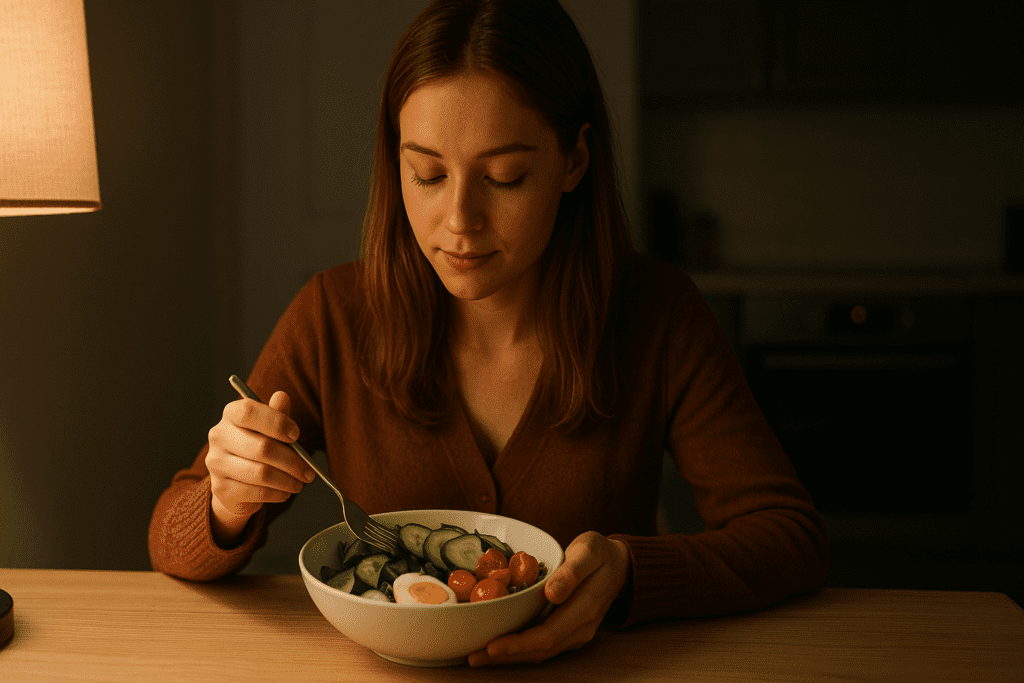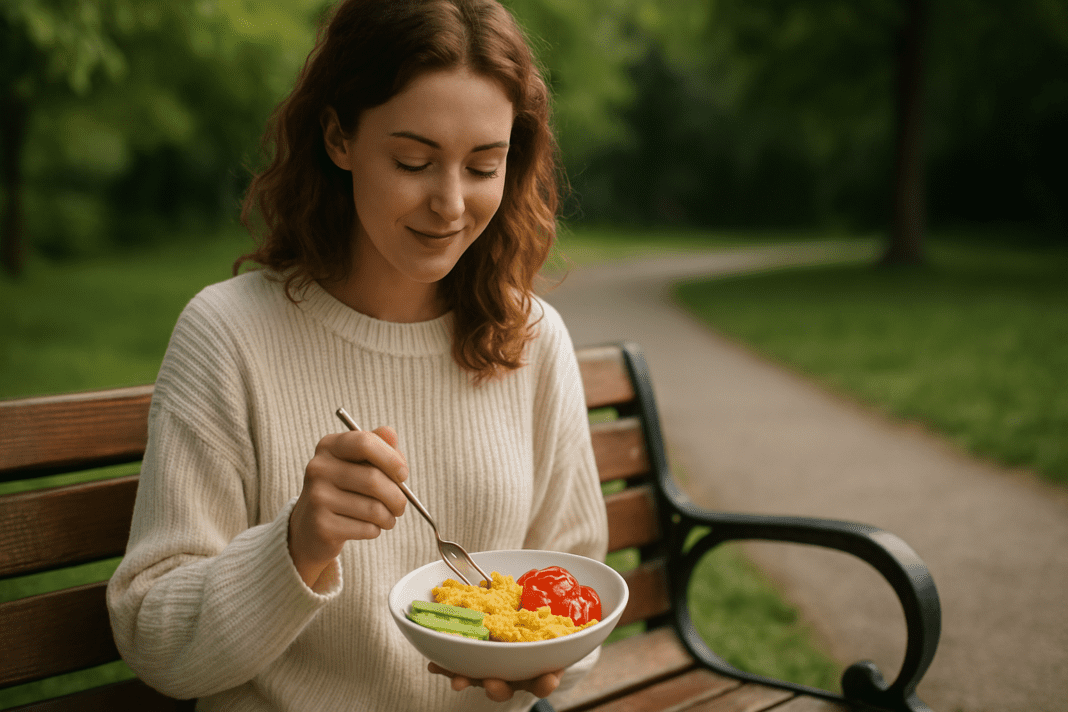Why Rethink the Morning Meal?
Breakfast is often called the most important meal of the day—but what we choose to eat can make all the difference. In many households, bread is the default morning staple, whether it’s toast with butter, a breakfast sandwich, or a sugary pastry. While convenient, these options often lack the nutritional depth needed to fuel our bodies properly. Many commercial breads, especially white or refined varieties, are low in fiber and high in added sugars or preservatives, which can lead to blood sugar spikes and mid-morning crashes. For those pursuing mindful eating or working toward a healthier lifestyle, this habitual reliance on bread deserves a second look.
Choosing breakfast ideas without bread isn’t about demonizing carbohydrates—it’s about making room for more nutrient-dense, whole food options that support energy, focus, and digestive health. Bread alternatives often deliver a better balance of protein, fiber, and healthy fats, all of which contribute to a more sustained feeling of fullness and mental clarity throughout the morning. Whether you’re managing weight, navigating food sensitivities, or simply exploring new ways to nourish your body, breakfast options without bread can offer a satisfying, delicious, and health-conscious way to start the day.
You may also like: Smart, Simple Recipes for a Balanced Diet: Expert-Backed Healthy Food Dishes to Support Everyday Wellness
The Downsides of Bread-Based Breakfasts
Though bread can be part of a balanced diet when chosen wisely, most breakfast breads available on grocery shelves are made from refined flours and come with a long list of additives. These kinds of highly processed products are digested rapidly, offering little in the way of lasting energy. Even when labeled as “whole grain” or “multigrain,” many are blended with refined flours, losing much of their nutritional benefit. This makes them less effective at keeping blood sugar stable, which is particularly important for individuals with insulin resistance or type 2 diabetes.
Moreover, bread-heavy breakfasts often push more balanced foods like fruits, vegetables, legumes, and nuts to the sidelines. These are the ingredients that provide vital nutrients such as magnesium, potassium, antioxidants, and dietary fiber—all of which are crucial for heart health, gut health, and longevity. A no bread breakfast helps to redirect focus toward whole ingredients that offer more than just calories. By replacing refined grain products with foods closer to their natural form, we support the body’s systems in a way that processed bread simply cannot.
There are also digestive considerations. For those with gluten sensitivities or autoimmune conditions like celiac disease, traditional bread can trigger inflammation, digestive distress, or nutrient malabsorption. Seeking non bread breakfast ideas becomes not just a preference, but a medical necessity. But even for those without gluten-related conditions, cutting back on processed breads can reduce bloating and improve overall digestive function—offering yet another reason to rethink what lands on the breakfast table.

The Power of Whole Foods in the Morning
Eliminating bread from your breakfast opens the door to a wide variety of whole food alternatives that are just as convenient and much more nutritious. These include fiber-rich fruits, protein-packed legumes, omega-3-rich seeds, and healthy fats from avocados, nuts, and olives. These foods not only help balance blood sugar but also reduce inflammation, promote satiety, and support long-term metabolic health.
Consider oats, a classic example of a no bread breakfast option that delivers both comfort and nutrition. When prepared with unsweetened almond milk or water and topped with chia seeds, berries, and a touch of cinnamon, oats provide soluble fiber that supports healthy cholesterol levels and digestion. Quinoa, a complete plant-based protein, is another excellent base for breakfast recipes without bread. When paired with roasted nuts and sliced apples or bananas, it becomes a warm, satisfying bowl with a balanced nutritional profile.
Another often-overlooked category is breakfast soups or stews. In many cultures, the morning meal includes warming broths and savory vegetable-based dishes that are naturally bread-free. These meals provide hydration, electrolytes, and a broader spectrum of phytonutrients, making them ideal for starting the day with a sense of grounding and fullness.

Protein-Packed Plant-Based Breakfasts
One of the biggest challenges people face when skipping bread is finding alternatives that still feel hearty and satisfying. That’s where plant-based proteins come into play. These ingredients offer the bulk and substance many people associate with traditional breakfast while delivering far more nutrition per bite.
Legumes such as lentils, chickpeas, and black beans are excellent examples. They’re high in fiber and protein, and when seasoned creatively, they can become the star of a savory breakfast plate. A lentil and vegetable hash with cumin, paprika, and garlic can be served alongside steamed greens or topped with a fried egg for added richness. Chickpeas, meanwhile, can be mashed with avocado and lemon to create a creamy, protein-packed filling for lettuce wraps or served over roasted sweet potatoes.
Tofu and tempeh are other standout players in breakfast options without bread. Tofu can be crumbled and sautéed with turmeric, black salt (for an eggy flavor), and diced vegetables for a satisfying scramble. Tempeh, with its firmer texture and naturally nutty taste, works well in skillet dishes or sliced and served cold with fresh herbs and sliced cucumbers. These ingredients form the core of many non bread breakfast ideas that deliver flavor, satiety, and nourishment without relying on refined grains.

Fiber-Focused Fruits and Vegetables
For many people, breakfast is the most rushed meal of the day, leading to quick carb-heavy choices that lack fiber. Yet fiber is crucial for digestion, blood sugar balance, and heart health. Fortunately, breakfast recipes without bread are often rich in naturally occurring fiber when fruits and vegetables take center stage.
Smoothies are a perfect example of how to integrate high-fiber foods into the morning routine. A smoothie made with spinach, frozen berries, ground flaxseeds, avocado, and unsweetened plant milk provides a spectrum of nutrients including vitamin C, potassium, fiber, and essential fatty acids. Adding half a cup of oats or chia seeds thickens the blend and increases satiety, offering a balanced and energizing alternative to bread-based meals.
Another creative option is the breakfast salad. It might seem unconventional, but a colorful plate of arugula, cherry tomatoes, roasted sweet potatoes, pumpkin seeds, and a soft-boiled egg topped with olive oil and lemon is a refreshing, fiber-rich way to start the day. These kinds of non bread breakfast ideas can feel gourmet, even with simple ingredients, and they allow for endless customization based on what’s in season or available at home.
Fruit and vegetable-forward meals also encourage variety, which is key to getting a full range of vitamins, minerals, and antioxidants. Eating a rainbow of plant-based foods—particularly at the start of the day—can support immune function, reduce inflammation, and promote long-term health.
Healthy Fats for Lasting Energy
Many traditional breakfast items are low in fat, especially healthy fats that keep us full and energized. Yet fat is a critical macronutrient, especially when paired with fiber and protein. In breakfast options without bread, healthy fats take center stage and contribute to flavor, texture, and metabolic balance.
Avocados are a breakfast superstar. Rich in heart-healthy monounsaturated fats, potassium, and fiber, they can be served sliced with lemon and sea salt or blended into a creamy smoothie base. When paired with eggs or legumes, avocados make for a balanced, sustaining meal that doesn’t require any bread to feel complete.
Nuts and seeds also offer concentrated nutrition. Almonds, walnuts, chia seeds, hemp seeds, and flaxseeds are high in omega-3s and antioxidants. Sprinkled over smoothie bowls, folded into oatmeal, or mixed into non-dairy yogurt, they add crunch and depth while enhancing the nutritional profile of your breakfast. Coconut milk or coconut cream can provide a rich, dairy-free fat source for breakfast curries or tropical-style bowls.
These fats help to stabilize blood sugar and curb cravings throughout the day. They also support brain function and hormonal balance—especially important for those with demanding schedules or active lifestyles. Including healthy fats in your no bread breakfast approach ensures meals are not only satisfying but nutritionally complete.
International Inspiration for Bread-Free Mornings
Cultures around the world offer breakfast traditions that have never relied on bread. Exploring these global meals can add flavor and excitement to your morning routine while reinforcing the idea that bread is not essential for a fulfilling breakfast.
In Japan, breakfast often includes rice, grilled fish, miso soup, and pickled vegetables. This nutrient-dense combination provides protein, fermented foods for gut health, and a variety of vitamins and minerals. Similarly, a Korean breakfast might feature kimchi, soup, steamed vegetables, and tofu—again emphasizing variety and balance without a slice of toast in sight.
Moving to the Mediterranean, it’s common to find olives, tomatoes, cucumbers, eggs, and fruit served with a drizzle of olive oil. These ingredients, central to the Mediterranean diet, offer powerful anti-inflammatory benefits and are naturally gluten-free. In South India, breakfast might consist of lentil-based stews like sambar, paired with vegetable sides or fermented rice-lentil cakes like idli or dosa—many of which can be made grain-free or with gluten-free grains.
Looking globally for inspiration broadens your palette and reinforces the idea that bread is optional. These traditional meals are not only flavorful and satisfying but often more nutrient-dense than the standard Western breakfast, making them excellent models for non bread breakfast ideas.
Convenience and Meal Prep Without Bread
One of the most common reasons people reach for bread in the morning is its ease. Toast is quick. A sandwich is portable. But with just a little forethought, breakfast recipes without bread can be just as convenient—and far more nutritious.
Overnight oats are a classic example of breakfast prep done right. Combining oats with plant-based milk, chia seeds, and fruit in a jar creates a ready-to-eat meal you can grab on your way out the door. These can be made in batches and customized with different flavors, like apple cinnamon or cocoa banana.
Another option is to prepare breakfast “wraps” using lettuce, collard greens, or nori sheets. Fill them with hummus, quinoa, chopped veggies, and tempeh for a savory, no bread breakfast that can be packed for work or school. Egg muffins or tofu bakes made in muffin tins also travel well and can be stored in the fridge or freezer for fast reheating.
Planning your breakfasts at the beginning of the week not only saves time but also ensures that you’re making intentional, health-promoting choices each day. By making non bread breakfast ideas part of your meal prep routine, you take the guesswork out of mornings and build healthier habits one bite at a time.
Here is your standalone, SEO-optimized FAQ section for the article “Smart Breakfast Ideas Without Bread: Nutritious, Easy Meals to Start Your Day Right.” This FAQ meets EEAT standards, introduces fresh perspectives, and integrates your keyword phrases naturally and strategically.
Frequently Asked Questions: Smart Breakfast Ideas Without Bread
1. What are the long-term health benefits of adopting breakfast recipes without bread?
Switching to breakfast recipes without bread can lead to more stable blood sugar levels, reduced inflammation, and improved metabolic health over time. Regularly consuming whole foods in the morning helps support insulin sensitivity, which is crucial for preventing type 2 diabetes and maintaining a healthy weight. Additionally, meals that prioritize vegetables, legumes, and healthy fats tend to promote gut health through their rich fiber content and diversity of plant-based compounds. By removing processed bread products from your daily routine, you’re also likely reducing your intake of preservatives and refined flours, both of which have been linked to chronic disease risk. Over months and years, these changes accumulate, supporting cardiovascular health, digestion, and even cognitive performance.
2. Are there any psychological or emotional benefits to eating a no bread breakfast?
Yes—there are meaningful psychological benefits to incorporating no bread breakfast habits into your lifestyle. Choosing meals based on whole, unprocessed ingredients can foster a stronger sense of self-care and intentionality. Many people find that this shift encourages mindfulness in eating, helping them to better tune into hunger and fullness cues throughout the day. Furthermore, by breaking away from heavily marketed convenience foods, individuals often feel more empowered and autonomous in their health decisions. The creativity required to explore new breakfast ideas without bread also brings an element of play and joy to the morning routine, setting a positive emotional tone for the day ahead.
3. How can I get enough energy in the morning without relying on bread or refined carbs?
Energy doesn’t have to come from fast-burning carbs. In fact, many breakfast options without bread provide longer-lasting fuel by combining complex carbohydrates, plant-based proteins, and healthy fats. A quinoa bowl with nuts, seeds, and berries, or a smoothie with avocado and chia seeds, delivers sustained energy without the sugar crash that often follows bread-based meals. These combinations also enhance mitochondrial efficiency, meaning your body converts food to energy more effectively. If you’re physically active or have a demanding schedule, integrating adaptogenic herbs like maca or adding a spoonful of nut butter can further support stamina and mental focus.
4. What are some overlooked pantry staples that support non bread breakfast ideas?
Several underrated pantry staples make excellent additions to a no bread breakfast approach. Amaranth and teff, for instance, are ancient grains that cook quickly and offer high levels of iron, calcium, and complete protein. Unsweetened coconut flakes and cacao nibs are great for adding texture and micronutrients to smoothie bowls or breakfast puddings. Canned beans, particularly black beans or cannellini, can be mashed with herbs and lemon for savory breakfast spreads or dips. These ingredients not only diversify your morning meal plan but also make breakfast recipes without bread more nutritionally complete and satisfying. Having these staples on hand helps you prepare meals quickly without sacrificing variety or depth of flavor.
5. Can skipping bread in the morning improve digestive health?
Absolutely. Many people report improved digestion after reducing or eliminating bread from their breakfasts. This may be due in part to removing common irritants like gluten, preservatives, or refined starches, which can trigger bloating or sluggish digestion in sensitive individuals. A no bread breakfast often includes ingredients like leafy greens, fermented foods, chia seeds, and berries—all of which support healthy gut flora and promote regularity. Over time, better digestive function can improve nutrient absorption and even support mental clarity and mood. For individuals struggling with IBS, food sensitivities, or post-meal fatigue, exploring breakfast ideas without bread could offer significant relief.
6. Are there time-saving tools or techniques that make breakfast without bread easier?
Yes—modern tools and prep techniques can make breakfast options without bread just as easy as traditional toast. Investing in a high-speed blender allows you to make smoothies, soups, and even quick batters for plant-based pancakes. Mason jar layering, especially for chia puddings or overnight oats, helps you prepare multiple meals at once. Batch-roasting vegetables or cooking grains ahead of time means you can build hearty breakfast bowls in minutes. An air fryer can crisp up tofu, tempeh, or root vegetables quickly without needing oil-heavy frying. These time-saving strategies ensure that breakfast recipes without bread remain practical even for the busiest morning schedules.
7. How can I make a no bread breakfast satisfying during cold seasons?
Many people crave warmth and comfort in the winter, and it’s completely possible to build a cozy, satisfying breakfast without bread. Start with warm bases like steel-cut oats, amaranth porridge, or mashed sweet potato. You can stir in warming spices like cinnamon, ginger, cardamom, and nutmeg for both flavor and digestive support. Top your base with toasted nuts, sautéed apples, or even a splash of warmed plant-based milk for a creamy finish. Savory options might include tofu scrambles with turmeric and root vegetables or miso soup with seaweed and edamame. These non-bread breakfast ideas are grounding, nutrient-dense, and ideal for colder months when your body needs extra warmth and nourishment.
8. What are some child-friendly breakfast ideas without bread?
Children can absolutely thrive on breakfast options without bread when meals are colorful, fun, and interactive. Smoothie bowls are a great starting point—let kids top their own with sliced fruits, seeds, and nut butters. You can also create “banana boats” by slicing a banana lengthwise and filling it with yogurt, berries, and crushed granola. Mini egg or tofu muffins loaded with veggies and baked in silicone molds make for playful, bite-sized meals. If your child enjoys dipping, offer sliced apples with nut butter or plantain chips with hummus as a balanced, engaging meal. These breakfast recipes without bread meet children’s nutritional needs while supporting variety and curiosity at the breakfast table.
9. How do non bread breakfast ideas fit into specific dietary plans like vegans or paleo?
One of the advantages of focusing on non-bread breakfast ideas is how easily they can be tailored to specific dietary frameworks. For vegans, breakfasts can emphasize tofu, legumes, nut milks, and fruits, forming complete meals without any animal products. Paleo eaters often center meals around protein, healthy fats, and vegetables—making options like egg scrambles with avocado and greens or grain-free porridge made with almond flour and seeds excellent fits. Those following Mediterranean or anti-inflammatory diets can draw inspiration from olive oil, nuts, lentils, and vegetables. Because these breakfast recipes without bread avoid common processed grains, they naturally align with many popular health-oriented eating plans.
10. What trends are shaping the future of breakfast without bread?
Several emerging trends are transforming how we approach no bread breakfast choices. One is the rise of gut-friendly foods—think fermented vegetables, non-dairy kefir, and fiber-rich plant-based meals that support the microbiome. Another is global fusion cuisine, where ingredients like za’atar, coconut milk, or miso are showing up in unexpected breakfast combinations. Technology is also playing a role, with smart kitchen tools simplifying the creation of fresh meals on busy mornings. Additionally, sustainability is becoming a key factor, with people favoring breakfast ideas without bread that rely on local, plant-forward, and low-waste ingredients. These shifts reflect a broader cultural move toward intentional, eco-conscious, and nutritionally sophisticated eating habits that go far beyond the traditional toast-and-eggs formula.
Conclusion: Embrace a Healthier Morning with Bread-Free Breakfasts
Making the shift toward breakfast recipes without bread may seem like a small change, but its impact on your health can be profound. By moving beyond the toast-and-jam routine, you open the door to vibrant, nutrient-packed meals that energize the body and nourish the mind. From plant-based proteins and antioxidant-rich fruits to heart-healthy fats and global culinary traditions, breakfast options without bread offer endless possibilities for creativity, flavor, and well-being.
These non-bread breakfast ideas support mindful eating, reduce reliance on processed carbs, and align with a holistic approach to wellness. Whether you’re seeking better blood sugar control, improved digestion, or simply more variety in your meals, choosing a no bread breakfast empowers you to take control of your nutrition in a delicious, sustainable way.
Ultimately, breakfast is a daily opportunity to show your body care and respect. By prioritizing whole foods and thoughtful choices from the very first meal, you set a positive tone for the rest of your day. With a little preparation and an open mind, you’ll discover that the best breakfasts don’t need bread at all—they just need intention, balance, and a touch of creativity.
healthy breakfast alternatives, gluten-free breakfast ideas, plant-based breakfast meals, low glycemic breakfast foods, high fiber morning meals, whole food breakfast recipes, no toast breakfast tips, clean eating breakfast choices, heart-healthy breakfast meals, protein-packed vegetarian breakfasts, diabetic-friendly breakfast options, weight loss breakfast meals, energizing morning nutrition, dairy-free breakfast choices, simple healthy breakfast swaps, mindful eating tips, sustainable breakfast habits, inflammation-reducing breakfast foods, wellness-focused breakfast plans, blood sugar balancing meals
Further Reading:
20 Heart-Healthy Breakfast Recipes in 15 Minutes
High-Protein, Low-Carb Breakfasts to Help You Lose Weight
Disclaimer
The information contained in this article is provided for general informational purposes only and is not intended to serve as medical, legal, or professional advice. While NewsHealthWatch strives to present accurate, up-to-date, and reliable content, no warranty or guarantee, expressed or implied, is made regarding the completeness, accuracy, or adequacy of the information provided. Readers are strongly advised to seek the guidance of a qualified healthcare provider or other relevant professionals before acting on any information contained in this article. NewsHealthWatch, its authors, editors, and contributors expressly disclaim any liability for any damages, losses, or consequences arising directly or indirectly from the use, interpretation, or reliance on any information presented herein. The views and opinions expressed in this article are those of the author(s) and do not necessarily reflect the official policies or positions of NewsHealthWatch.

